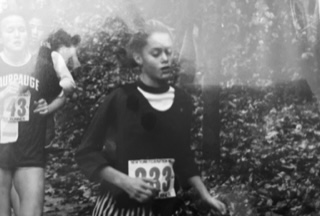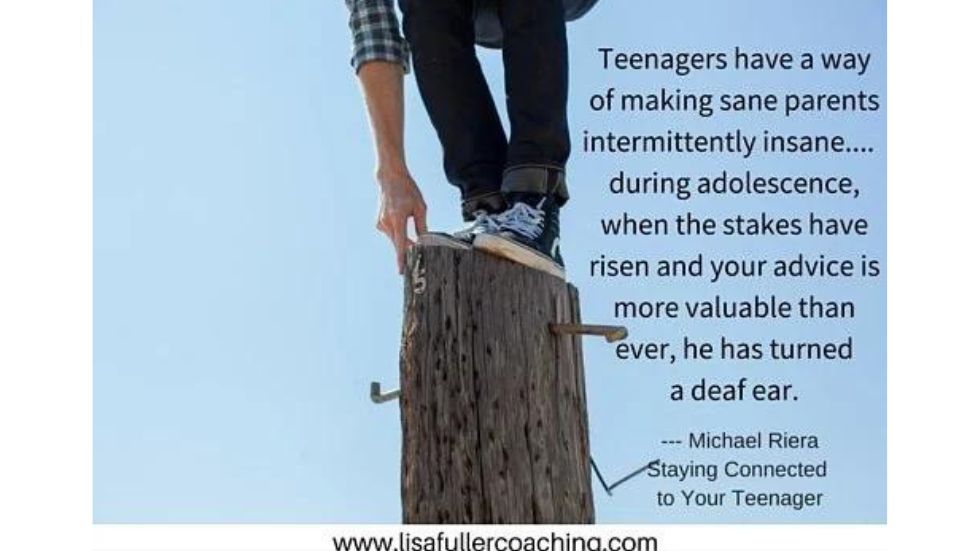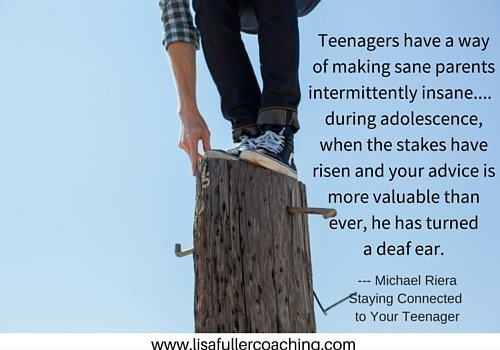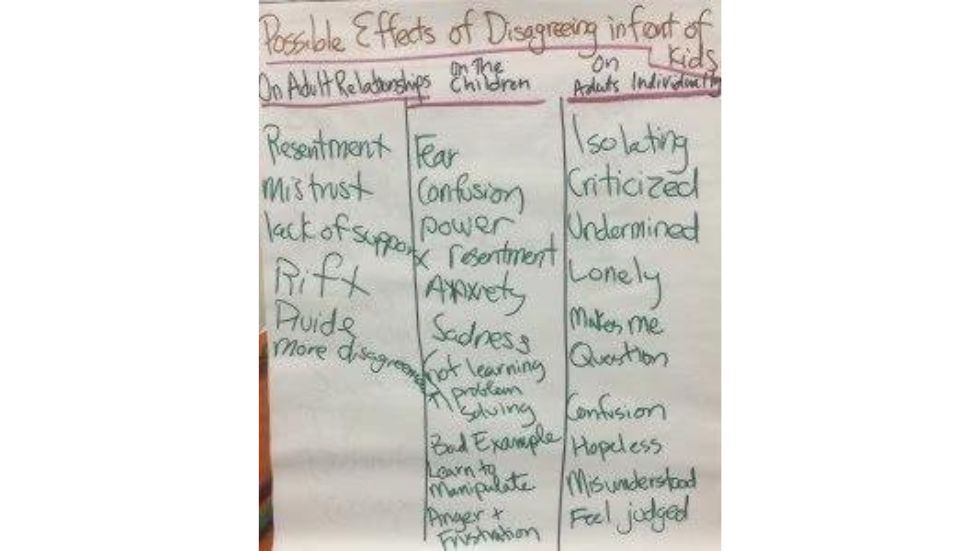by Lisa Fuller | Sep 7, 2023 | Communication, Conflict, Connection & Love, Encouragement, General, Parenting, Self-care, Setting Limits, teenager
 I was competing in my first cross country race, a freshman in high school, when I hit the notorious ‘wall’ going up aptly named Cemetery Hill in Van Cortlandt Park in the Bronx. My legs felt like lead stumps, my breath was short and effortful, and utterly defeated I decided to walk. Then I heard a voice, it was my Coach Mitch, yelling in his Queens accent, Come on Fuller, you can do this!!! I didn’t even know he was there, yet somehow he appeared, clipboard shoved in his armpit so he could clap his hands and wave me up the hill. As I trudged past him, I used the little energy I had to swear at him.
I was competing in my first cross country race, a freshman in high school, when I hit the notorious ‘wall’ going up aptly named Cemetery Hill in Van Cortlandt Park in the Bronx. My legs felt like lead stumps, my breath was short and effortful, and utterly defeated I decided to walk. Then I heard a voice, it was my Coach Mitch, yelling in his Queens accent, Come on Fuller, you can do this!!! I didn’t even know he was there, yet somehow he appeared, clipboard shoved in his armpit so he could clap his hands and wave me up the hill. As I trudged past him, I used the little energy I had to swear at him.
I had to keep going
At the time I didn’t understand it but looking back now it’s clear I was furious at Mitch because I wanted to give up and he wouldn’t let me. His words meant someone had faith in me and was expecting me to finish, so I had to keep going.
We are both the runner in this story AND the coach
As parents, we know that standing by our children during their darkest hours requires a special kind of endurance. We are both the runner in this story AND the coach. We have to endure the pain and take the brunt of our children’s stress, anxiety and even anger at the challenges they face.
Do you remember that feeling of intense love and simultaneous dread when you first became a parent? For me it sounded like this, “from here on out, I will, without question, jump in front of a bus for this human.” My children would forever be my priority.
But it wasn’t until son #2 was in high school and became addicted to vaping, then drugs, that I realized the depth of inner strength I’d need to endure this level of challenge for my child.
Parenting calls upon the limits of human endurance
If you’ve ever loved a child suffering with addiction (or mental health issues, learning differences, social challenges or any of the other tough situations that young people face), you know how hard and painful it is to let go while also being present and not giving up. Parenting calls upon the limits of human endurance.*
FIX IT!
As a mother, my first instinct was to fix the problem. I fed him nutritious and delicious meals. I monitored who he hung out with, where he went. I tried, through lengthy discussion, to talk him out of it. And we even went to hot yoga together twice a week at 5:30am (confusing I know but it was part of his effort to convince me that he didn’t have a problem). But nothing fixed it or got him to stop using drugs. Nothing fixed the tension in our home, the silence, the anger and sadness.
Let go….
Finally, with resignation and relief, I let go and focused on what I could control: myself. I knew the only thing I could do was to continue showing up for him. Continuing to show up for someone you’re sometimes afraid of and other times furious at isn’t simple. Equally, if not more difficult was to continuously muster the courage I’d need to have faith that he would get through it, that he would make it up that hill alive.
Most of the time I felt like a failure and also a person who was doing her best.
During these three years my father died, my grandmother died, my dog died and I was diagnosed with skin cancer.
As a parent we endure what our children go through while juggling the complexities of our own life.
During these three years, I was in disbelief, not that this was happening in our family, but just at how extraordinarily painful life can be.
I questioned if I could keep going through my grief and fear, but I knew that giving up was not an option. It felt like that bus I’d imagined 20 years ago was heading directly for me.
With some combination of good fortune and persistence, my son and I survived, which is a story for another time. Everyday I’m grateful and everyday I know how lucky we are because there are so many families who continue to suffer or don’t make it.
Today he’s working as a counselor with young people facing addiction while attending college. He tells me that what made the difference for him was knowing he had a family that loved him and didn’t give up on him, even when he gave up on himself.
You can read my specific strategies for supporting a child in the throes of addiction below.
If you’re facing a hard situation as a parent I’m here to remind you:
- You’re not alone and that the isolation that parents feel during such a struggle adds immeasurably to the pain… so even though it can feel impossible, I encourage you to reach out for support.
- While you feel like you’re forging your way up your own Cemetery Hill, you have the power to tap into the special kind of endurance despite the sadness, anger or fear you may be experiencing, you can do this. You can hang in there when it hurts and when you mess up and say the wrong thing. Your child will know you tried your best even in the worst of times.
You can do this!!!
Endurance of mind, heart and body for loving an addicted child:
- Establish firm boundaries around safety: I did not leave his younger sister alone with him, nor did I let him drive the car.
- Don’t be afraid to enlist help: I met repeatedly with the vice principal to discuss strategies to make drug use at school more difficult, and reached out to teachers and coaches for support.
- Allow for natural consequences: I did not call the school to excuse his tardiness, absenses, missed work, or neglect for sports practice or competitions.
- Take care of yourself: I made imperfect efforts towards attending weekly (sometimes daily) Al-Anon meetings, reaching out to friends for support, writing it down, exercising, eating healthy food and trying to get enough sleep (this was particularly challenging).
- Cultivate self-compassion: this level two in self-care is a key to how well we treat ourselves and others. Kristen Neff has exercises to help cultivate true self-compassion and one of those is writing.
- Strive for consistency: I maintained predictable meal times, regular communication, and continued to literally tuck him in at bedtime each evening, despite the pain of facing his condition.
- Be present for the recovery journey: I researched school and treatment options, accompanied him to programs, picked him up when he failed, found other options, and kept walking the road with him towards recovery.
- Share your struggle with others: I didn’t keep his drug problem a secret or let it become a cause for shame for him or myself. I reminded myself that drug addiction is an all too common issue for families and I could lean on others for support.
To learn more about how I might be able to support you, schedule a time to meet.
Join my 7-week Parenting Series (via Zoom) beginning September 28th!
This post was inspired by a quote by George Yeoman Pocock that I first read years ago as it was the epigraph to The Boys in the Boat by Daniel James Brown. I was teaching parenting classes at that time and the words jumped off the page. His insights into the special kind of endurance needed for rowing described perfectly the predicament we parents find ourselves in.
Rowing is perhaps the toughest of sports. Once the race starts, there are no time-outs, no substitutions. It calls upon the limits of human endurance. The coach must therefore impart the secrets of the special kind of endurance that comes from mind, heart, and body.

by Lisa Fuller | Mar 6, 2016 | Conflict, General, Parenting, teenager
 My relationship with my teen has been jaggedy.
My relationship with my teen has been jaggedy.
Over the past several months I’ve felt tested and provoked like never before. It’s not easy. We’re on solid ground right now but I admit to having intermittent moments of insanity.
One thing I’ve learned as a parenting educator and so called expert is that I’m not the only one going through this… that’s a relief. 😌
Are you facing challenges with your teen that leave you doubting yourself?
As my teen has veered into the territory of seriously challenging behavior, I’ve kept one goal in mind, as hard as it is, stay connected.
7 ideas for how to stay connected to your teen – even when they’re REALLY pushing your buttons:
- Exaggerate positivity — A study by Deborah Yurgelun-Todd found that teens use their “gut” as opposed to their frontal lobe to interpret facial expressions. In short an adult’s “fearful facial expression” was misinterpreted as anger, confusion or sadness 50% of the time.

Source:www.pbs.org/wgbh/pages/frontline/shows/teenbrain/interviews/todd.html
Knowing this, I’ve amped up my enthusiasm when I interact with my son and try to greet him with a huge “I love you” smile on my face — one that can’t be misinterpreted — when he comes home.
This strategy has helped me regain some closeness with him, and he frequently asks me to check in on him when he’s waking or retiring for the evening. You still matter to your teen, even though they’re doing their darndest to push you away.
2. Use a quiet tone of voice — Although you may be feeling emotional, when possible use a quieter voice with your teen. Similar to facial expressions, teens can interpret increased volume as anger.
3. Be explicit — When you ARE angry or annoyed about something say it in plain language, using as few words as possible. For example:
I’m angry that you didn’t text me letting me know you’d be late.
I’m angry because I’ve been so worried that something happened to you and I love you.
Try to avoid lecturing or adding editorial comments (e.g., “We have talked about the need to text me back a million times and I’m sick of it!”). You may find that stating your feelings clearly calms you down too.
[tweetthis]Sometimes it takes a moment for us to uncover why we’re angry at our teen… oh yeah, it’s because I would step in front of a bus for this kid if necessary![/tweetthis]
Deborah Yurgelun-Todd’s study supports this strategy, too.
4. Make yourself available to your teen, even when it feels inconvenient. The other night I was snug in my bed when my teen came home and asked me to come watch Survivor with him. I did 🙂
5. Use humor — Teens take themselves seriously. The angst and insecurity they feel is real for them even though you may see it as overly dramatic. I’ve found humor – the cornier the better – can provide a counter weight to all that teen gloom. Ridiculous as it sounds, I use silly voices, faces and poop talk. These tactics lighten ME up and make me laugh.
I’ll spare you the details but one night I was woken by police banging on my door. Apparently I had to retrieve my son from a parking lot not far from my home. When I arrived, he was fine, his “crime” with sitting in a car with a girl (no substances). He got in the car and looked at me, afraid of my reaction. I cracked a smile and started laughing. He said “Mom, I’m glad you’re laughing. I’m sorry you had to to come get me.”
Use your sense of humor to bring levity to what can feel like a heavy relationship with your teen. They’ll be relieved that you’ve got space to breathe and have fun and it just might open the door for them to do the same.
6. Post a visual reminder that clearly shows the essence of your child — Find a photo of your teen as a younger person – a photo that you love – with an expression on their face that captures your heart. Carry this photo with you or put it somewhere easy to see. Use this as a visual reminder of who this kid really is in his heart. Your teen can look and act downright ugly and an image can remind you of the deep love you have for him, even when you’re not feeling it every moment.
of your teen as a younger person – a photo that you love – with an expression on their face that captures your heart. Carry this photo with you or put it somewhere easy to see. Use this as a visual reminder of who this kid really is in his heart. Your teen can look and act downright ugly and an image can remind you of the deep love you have for him, even when you’re not feeling it every moment.
7. Take care of yourself — Make this a priority because in order to be on top of your game, in order to actually do 1 – 5, you need a deep well of strength to draw from. Remember, children do better when they feel better and so will YOU. You can’t expect humor, listening, positivity, etc. from yourself when you’re depleted.
Exercise, rest, see friends, get outside- whatever fills your tank, find time to do it. Your teen will thank you!
Parenting a teen is no joke. Dig deep, breathe deep, and in that quiet space invite faith that they will be okay, that you’re doing the best you can by being present when you can, setting limits as needed and providing unconditional love. They won’t be an adolescent forever.
Lastly, although parenting a teen can lead to a deep desire for control – especially when their behavior seems out of control – the same principle of kindness and firmness applies. Although I’m tempted to ‘lay down the law’ with my teen, I know that if I lose connection with him, I have no chance of helping him make good choices in his life.
Have you found other ways to manage difficult adolescent behaviors? Please share in the comment section below or send me an email. I love to hear from you.
If you’re in the Bay Area, join me for Parenting with Positive Discipline. This series is geared for parents of children of all ages.
Ready for more, watch this in-depth interview where Dan Siegel discusses his book Brainstorm ~ the scientific developmental stage of adolescence.

by Lisa Fuller | Feb 24, 2016 | Communication, Conflict, General
 As much as we wish it weren’t true, our relationship with our parenting partner, how we communicate, how we make decisions and how we parent… is closely observed by our children.
As much as we wish it weren’t true, our relationship with our parenting partner, how we communicate, how we make decisions and how we parent… is closely observed by our children.
Of course we are not going to have a perfect partnership but there are ways we can increase the odds of providing a healthy model.
Below is a list of resources to explore to learn more on this topic including tips on how to come closer together in parenting styles and how to best manage conflict in your co-parenting marriage.
Ideas For How to Deal with the Dreaded Style Clash
When You Don’t Discipline the Same Way from Power to Change.com.
Best Practices for How to “Fight” When You’ve Got Kids
12 Keys To Healthy Partnership Conflict Resolution When you Live With Kids from Aha Parenting.
Parent Arguments: How Do They Effect Children? from Bright Horizons Family Solutions.
Family meetings are a wonderful resource to help find solutions to all sorts of issues that families experience. They also provide a forum for parent to model working out challenges in a positive, open, solutions oriented manner. Here is a guide that I created to help make family meetings EASY.
Having a regular “parenting pow-wow” can also be extremely helpful: setting aside some time each week or month to make agreements on how to handle various parenting challenges, and what you will do when you not not agree on a course of action.
In our recent Roots session we explored the following questions:
- What are the possible effects of disagreeing in front of the kids on the adult relationship, children and on the individual adult?
- What are typical topics that parents and caregivers disagree over?
- What are respectful alternatives when parents disagree?
- What are the possible effects of these alternatives on the adult relationship, children and on the individual adult?

Possible Effects of Disagreeing in Front of Kids

Typical Topics For Parent/Caregiver Disagreements

Respectful Alternatives When Parents/Caregivers Disagree

Possible Effects of Respectful Alternatives
In these last two posters we looked at how parents with different styles, specifically one who is “more Positive Discipline” leaning and one who is less, might support each other best. We came up with DO’s and DON’T’s for each person.

The More Positive Discipline Parent is encourage to:

The Less Positive Discipline Parents who like the More Parent to:
This topic is alive on this seemingly static page! Please use the comment section to add your thoughts and additional resources to share on this important of how parents with different parenting styles can be successful.

by Lisa Fuller | Apr 26, 2015 | Conflict, General, Parenting, Self-regulation, Sibling Issues
Here’s Part Two of the 3 part Sibling Series: More Good, Less Ugly: Everything you Need to Know to Foster Healthy Sibling Relationships. In case you missed it, you can check out Part One here.
A month ago, after a parent education talk (ironically, NOT about sibling issues), parents came up to me afterwards wanting to ask specific what do I do when questions.
This night each parent had a sibling challenge that deeply distressed them — and they wanted advice on how to work them out — how to FIX them.
After each told me their story of fists, tears, tussles and injustices, I asked, sincerely, so you want this to stop because ________?
It sounds like a joke but I was serious.
Here’s a snippet of their answers (and my thoughts):
- I don’t want my kids to fight. Period. (We get confused thinking peace equals the absence of conflict — not true)
- I’m afraid my children will seriously hurt each other — (it won’t happen if your kids have some skills — it makes sense to focus on teaching these skills).
- I was mistreated and abused by my siblings and my parents did nothing (if you’re reading this post, or trying to understand the issues, you’re not doing nothing. You’re learning how to respond rather than react).
It’s important for you to get to the bottom of your frantic need to end sibling fights.
When you feel desperate, your children tune into your urgency and — baBOOM! — their fights gain greater importance and power.
No matter what age they are, you can see the wheels turning in their mind… “Hey, I’m onto something here — mom’s lost her mind over this bickering — it’s energizing to have her so plugged in so I’m going to persist and/or do it again soon.”
[tweetthis]Even if a child is scared, negative engagement with you is better than the alternative, no connection[/tweetthis]
Your children are wired to get your attention (think survival) and this sibling stuff is just the ticket.
So what if you don’t react when the fight breaks out, and instead acknowledge them by:
- Letting them know you notice what’s going on and you’re here if they need your help (hint: think of yourself as a consultant rather than a cop) or
- Saying, “I can see you’re struggling with each other and I have faith that you’ll be able to work it out together.”
What’ll happen next? They’ll be flabbergasted that you haven’t jumped in to fix or solve.
Jane Nelsen says surprise leads to confusion. When a child is confused because she doesn’t get the reaction she’s used to, she’s ready to consider a new behavior.
- If the surprise results from a respectful interaction, her confusion will include a feeling of belonging and encouragement, so her new behavior is likely to be positive.
- If the surprise is a result of disrespect, then her previous misbehavior is likely to intensify.
After a recent sibling talk I got this email from a mom who’d bravely tried what I’d suggested, the very next morning:
Hi Lisa,
I wanted to tell you my success story from this morning. I feel like one of the examples from the book (Siblings without Rivalry), I was so surprised at its effectiveness!
This morning my 5.5yo son Eden left his favorite transformer toys on the floor, and his 1.5yo sister Lulu ran to them and started playing. He saw that, ran over, and pushed her backwards so her head banged the floor (she’s had worse bumps, but it was still rough and it hurt her).
I calmly went over and said, “Do you two need some help? Lulu doesn’t know why you pushed her. Use your words to tell her. I know you two can work this out. I’m going in the kitchen now so you can work it out.”
I walked away as Lulu whimpered a few times, just sitting next to her brother, probably unsure why I hadn’t defended her better.
Only 5 to 10 seconds after I walked away, Eden said, “Hey Louie, do you want another one?! I’ll get you one!” and jumped up to get her the one transformer he wasn’t playing with. He gave it to her, she happily accepted, and she scooted away a few inches to play with it in her own space.
I COULDN’T BELIEVE IT! It was exactly like the book and you said it would happen! Even though it worked so well, I admit I felt a bit guilty about seemingly abandoning Louie to her big brother in a moment of distress. But I get that their relationship benefitted from his problem-solving so much more than if I had stepped in.
Based on the book, if we can be consistent with this kind of conflict resolution, soon both kids will not feel this as abandonment, but as empowerment instead.
–Rachel
This story beautifully illustrates that [tweetthis]you don’t stop teaching your kids just because you don’t get involved in the moment of conflict.[/tweetthis]
Rachel admits the guilt she felt in trying a new behavior — I think many of us don’t try new tools and responses, even though they may be more effective in the long run, because of the dreaded parent guilt – what’ll happen if it doesn’t work?.
There may be times when you want to step in — how do you do that without fixing?
Here are three Positive Discipline Tools to help in the moment with a dispute between young children:
- DISTRACTION — “I’ll give you something else to do now.”
- SEPARATION — “Let’s move you over here for now.”
- PUTTING KIDS IN THE SAME BOAT and recognizing that CHILDREN DO BETTER WHEN THEY FEEL BETTER — “I’d like to read you both a story now – it will help put us in a good mood. Then you can try to play together again… when you both feel better.”
So often when you plunge into a sibling fight, you think you know what’s going on.
This week, pretend you don’t and put the kids in the same boat.
Do your best to stay out of their business (or consult from the sidelines), and see what happens.
Please share your thoughts in the comments below.
If you’re not already on the list, sign up to receive Part 3 of the Sibling Series: From Squabbles to Sharing: Proven Strategies to Improve Sibling Relationships by email.

by Lisa Fuller | Feb 18, 2014 | Conflict, Discipline, General, Motivation, Power struggle, Self-regulation
Do you often feel CHALLENGED by your child? You’re not alone. If you’re like me, you’ve got a kid who will argue with or defy you at every turn. Can you say, “power struggle”?
Here’s the twist – I’ve grown to cherish this quality in my son, E. – he’s inspired me to teach Positive Discipline and grow in ways I never imagined.
Amen!
In my last post I wrote about a time when I lost it with him.
Today, I want to introduce a powerful tool that will give you concrete, helpful responses to your child’s misbehavior based on… drum roll please – how YOU feel.
The end result? A child who’ll more likely cooperate, contribute, and act like a leader in the best sense.
Here’s my before-and-after story to illustrate how using this tool, and identifying my feelings, gave me the opportunity to have an AFTER to write home about!
Before
I was cooking dinner one afternoon. My 12-year-old son was playing the piano in the other room. From the kitchen I could hear 8-year-old E.(enter our ‘hero’) join his brother at the piano and begin running his forearm up and down the keys, causing a cacophony.
My jaw clenched. I burst onto the scene and yelled at him, “WHAT ARE YOU DOING?! LEAVE YOUR BROTHER ALONE! GO UP TO YOUR ROOM RIGHT NOW!”
Not my most inspired parenting moment but one I think many parents can relate to.
Later, I asked myself these questions:
-
What did my son learn from this interaction? “Mom is crazy, Mom is mean,” etc.
-
Do we feel harmonious and connected? No. I’m angry. He’s likely feeling indignant, hurt or both.
Now’s my chance to use that tool I mentioned earlier.
Don’t let this chart intimidate you! I use it to give me an idea of how to respond based on HOW I FEEL when E. bangs on the piano. Yes, it sounds counter-intuitive, but observe how it WORKS….
In my noisy example I’m feeling CHALLENGED. Based on the chart (see second row – misguided power), my son believes “I count or belong only when I’m boss, in control, or proving no one can boss me.” This rings true to me… how about for you?
Here’s what happens when I use the suggestion in the final column.
After 
Piano cacophony starts: I say calmly, “E., I could use your help here in the kitchen. What do you think about using this sharp knife to chop these carrots for the soup?”
His eyes light up, and before I know it, we‘re working together, happily making dinner.
Giving E. work and/or responsibility is often right on the money when I start to feel provoked by him. This requires me to pause and have the presence of mind to respond rather than having my knee-jerk reaction.
Don’t try to memorize the chart. It’s simply a tool for guiding new responses based on how YOU feel when your child misbehaves. Hang it on your fridge or bathroom mirror so you can refer to it easily.
Positive Discipline isn’t about doing everything just right for your kids.
It’s more about the power of thinking ahead and the awareness that my child’s misbehavior is an opportunity to teach him what I value most – in this example: patience, creativity, and that the work it takes to create a yummy meal can be fun.
Utilize the chart and one day, when the scene is set for that familiar conflict, you’ll respond (instead of react), and out of the blue, experience the wonder of your child’s generous cooperation.
P.S. Carefully place a sharp knife into your toolkit and… magic!
CONSIDER⇔SHARE⇔ACT
Do you have an on-going dynamic with your child where you could see using this tool? How?
What’s the difference for you when you respond rather than react to your child or for that matter, anything in your life?
Share your thoughts below! It’s encouraging to know we’re not alone in this parenting journey!

by Lisa Fuller | Jun 24, 2013 | Conflict, Feelings & Emotions, General, Parenting, Power struggle
My husband texts me “Just rode our first coaster – Colossus!  ”
”
Little does he know I’ve been riding one at home and it’s not nearly as thrilling.
He’s taken Ethan and two friends to Magic Mountain for the weekend to celebrate Ethan’s 14th birthday.
I’m home with our newly hatched 1st grader and experiencing the breezy joys of the first day of summer!
Not…
After a late night her eyes are at half mast and simply put, nothing is right.
She demands to go to the pool. I say, that’s not going to work today.
And the tirade begins – I’m sparing you many of the gruesome details but these quotes will give you the flavor.
You’re the boringest in my whole entire family because you always mention boring things to me and I HATE YOU!
I want daddy!
I wish I were dead!
(she repeats this last one several times I think because she’s startled that I’m not reacting)
I’m not as composed as I want to be. Being a parent educator can really inflame feelings of parental inadequacy. My inner dialogue that thankfully doesn’t come out my mouth is, S you’re acting like a spoiled brat and
what have I done to create this monster? How can I possibly say I have any answers for parents when my kid is acting like this!
When I speak to her I take it down a few notches saying, You’re tired. Maybe you’re even sick because this is how you act when you’re sick. There’s not much sympathy in my voice as I continue along these lines. She’s infuriated.
On the upside, I bear lots of her rage and both of our discomfort. Bearing it is good. Breathing through it is great. I give breathing a try and it helps.
As far as I can tell, along with deep breathing, the following are key elements that finally shift the energy.
It feels like a good hour of our back and forth. She pleads, I ignore, she rages, I stop and give her some kind and firm attention, she storms off, I fold laundry, ignore and finally I ask for her help.
One my favorite Positive Discipline sayings is children do better when they feel better. When I ask her for help, I tap into her desire for significance and belonging. While we’re not always aware of it, all of us are looking for significance and belonging.
Notice how imperfectly I handle this yet how important it is that I persist.
First, I suggest she pick up her room – she says NO – (admittedly a knee jerk bound to fail request on my part).
Second, I suggest she help clear the living room of her toys – NO! That’s two strikes….
Third, I ASK how she’d like to help and I LISTEN when she says she wants to help in the kitchen. She gets a stool and I fill a basin with warm soapy water. Singing quietly, she scrubs dishes for a solid 15 minutes. (I’m in another room).
Like roller coasters inevitably do, it feels like this one is coming to a surprisingly smooth and sudden stop.
Now she’s done scrubbing and she’s disappeared.
I hear a harmonica in the distance.
CONSIDER⇔SHARE⇔ACT
Here’s your chance to support another parent! Share in the comment section below.
We ALL lose it as parents. On those days when you’re able to remain calm when your child presses your button, what’s different?
How will you make space for these calming features of life?
 I was competing in my first cross country race, a freshman in high school, when I hit the notorious ‘wall’ going up aptly named Cemetery Hill in Van Cortlandt Park in the Bronx. My legs felt like lead stumps, my breath was short and effortful, and utterly defeated I decided to walk. Then I heard a voice, it was my Coach Mitch, yelling in his Queens accent, Come on Fuller, you can do this!!! I didn’t even know he was there, yet somehow he appeared, clipboard shoved in his armpit so he could clap his hands and wave me up the hill. As I trudged past him, I used the little energy I had to swear at him.
I was competing in my first cross country race, a freshman in high school, when I hit the notorious ‘wall’ going up aptly named Cemetery Hill in Van Cortlandt Park in the Bronx. My legs felt like lead stumps, my breath was short and effortful, and utterly defeated I decided to walk. Then I heard a voice, it was my Coach Mitch, yelling in his Queens accent, Come on Fuller, you can do this!!! I didn’t even know he was there, yet somehow he appeared, clipboard shoved in his armpit so he could clap his hands and wave me up the hill. As I trudged past him, I used the little energy I had to swear at him. 


















